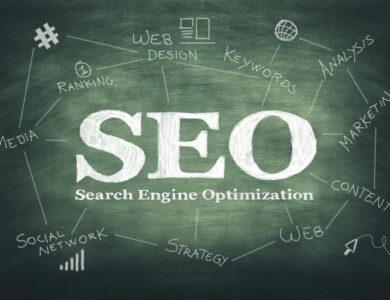
In today’s digital age, where online presence has become paramount for businesses and individuals alike, the concept of search engine optimization (SEO) has emerged as a powerful tool to enhance visibility and drive organic traffic to websites. SEO refers to the practice of optimizing a website’s visibility and rankings on search engine result pages (SERPs). By implementing SEO practices, websites can increase their chances of appearing higher in search engine rankings when users search for relevant keywords or phrases. This, in turn, facilitates greater organic (non-paid) traffic to the website.
The importance of search engine optimization cannot be overstated. It plays a pivotal role in the digital landscape by boosting visibility, driving organic traffic, and establishing credibility. With billions of websites competing for attention, SEO acts as a guiding light, ensuring that your website stands out amidst the digital noise. By optimizing your website’s content, structure, and keywords, you can increase its visibility, attract more organic traffic, and ultimately reach a wider audience.
Moreover, SEO is not just about appeasing search engine algorithms; it’s also about enhancing the overall user experience. By optimizing website speed, navigation, and mobile-friendliness, SEO helps create a seamless and enjoyable browsing experience for users, keeping them engaged and encouraging them to explore further. When your website ranks high on search engine results pages, it automatically gains credibility and authority in the eyes of users. By implementing effective SEO strategies, you can build trust with both search engines and users, establishing your brand as a reputable and trustworthy entity.
TOP 15 importance of search engine optimization

1. Increased Organic Traffic:
SEO helps drive more organic (non-paid) traffic to your website, resulting in a larger audience and potential customers.
2. Higher Search Engine Rankings:
By optimizing your website, you can improve its visibility and rankings on search engine result pages (SERPs), leading to increased exposure and click-through rates.
3. Improved User Experience:
SEO involves optimizing your website’s structure, navigation, and content, creating a seamless and user-friendly experience that keeps visitors engaged and encourages them to explore further, underscoring the importance of search engine optimization.
4. Enhanced Brand Visibility:
Being visible on the first page of search results builds brand awareness and establishes your brand as a trustworthy and reputable authority in your industry.
5. Targeted Traffic:
One of The importance of search engine optimization allows you to target specific keywords and optimize your content, attracting users who are actively searching for products or services related to your business, and increasing the chances of conversion.
6. Cost-Effectiveness:
SEO is a cost-effective marketing strategy compared to paid advertising, as it focuses on organic traffic and long-term results, underscoring the importance of search engine optimization.
7. High ROI:
Effective SEO strategies can generate a high return on investment by attracting qualified leads and potential customers who are more likely to convert.
8. Beat the Competition:
By outranking your competitors in search results, you gain a competitive edge and capture a larger share of the market, underscoring the importance of search engine optimization.
9. Mobile Optimization:
With the increasing use of mobile devices, optimizing your website for mobile users is crucial for reaching a wider audience and improving user experience.
10. Local Search Optimization:
For businesses targeting local customers, local SEO techniques help improve visibility in local search results, such as Google Maps and local directories, underscoring the importance of search engine optimization.
11. Trust and Credibility:
Appearing on the first page of search results builds trust with users, as they perceive top-ranking websites as more credible and reliable sources of information or products.
12. Long-Term Results:
SEO is a long-term strategy that can provide sustained visibility and traffic to your website, unlike temporary results from paid advertising.
13. Valuable Insights:
SEO tools and analytics provide valuable data and insights into user behavior, allowing you to make informed decisions and optimize your marketing strategies, underscoring the importance of search engine optimization.
14. Brand Authority:
Consistently publishing high-quality content, earning backlinks, and engaging in SEO practices help establish your brand as an industry authority and thought leader.
15. Adaptability to Algorithm Changes:
Search engine algorithms constantly evolve, but a strong SEO foundation ensures that your website remains adaptable to these changes, maintaining its visibility and rankings, underscoring the importance of search engine optimization.
Key Components of Search Engine Optimization
A. On-Page Optimization:
1. Keyword Research and Targeting: Conducting thorough keyword research to identify relevant keywords and strategically incorporating them into your website’s content to improve its visibility in search results.
2. Meta Tags and Title Optimization: Optimizing meta tags, including meta descriptions and title tags, to accurately describe your web pages and make them more enticing for users to click on in search results.
3. Content Optimization and Relevance: Creating high-quality, relevant, and engaging content that aligns with user search intent and incorporates targeted keywords naturally throughout the page.
B. Off-Page Optimization:
1. Link Building Strategies: Acquiring high-quality backlinks from reputable and relevant websites to improve your website’s authority and credibility in the eyes of search engines.
2. Social Media Signals and Engagement: Leveraging social media platforms to promote your content, engage with your audience, and generate social signals that can positively impact your search engine rankings.
3. Online Reputation Management: Monitoring and managing your online reputation by responding to customer reviews, addressing negative feedback, and maintaining a positive online brand image.
C. Technical Optimization:
1. Website Speed and Performance: Optimizing your website’s loading speed, minimizing code and image size, and implementing caching techniques to enhance user experience and improve search engine rankings.
2. Mobile-Friendliness and Responsiveness: Ensuring your website is mobile-friendly and responsive, allowing it to adapt to different screen sizes and devices, as mobile optimization is a critical ranking factor.
3. Site Architecture and XML Sitemaps: Creating a clear and logical site structure that facilitates easy navigation for users and search engine crawlers. XML sitemaps help search engines understand the organization of your website and index its content more effectively.
These key components of search engine optimization (SEO) work together to improve your website’s visibility, relevance, and user experience, underscoring the importance of search engine optimization. By implementing on-page optimization techniques, building high-quality backlinks, managing your online reputation, and addressing technical aspects, you can enhance your website’s chances of ranking higher in search engine results pages (SERPs) and attracting organic traffic.
FAQ About The importance of search engine optimization
Why is search engine optimization (SEO) important?
SEO is crucial because it helps businesses improve their organic visibility on search engines, leading to increased website traffic, qualified leads, and potential customers. It enhances user experience, builds brand credibility and authority, and provides a competitive edge in the online market.
How does SEO benefit businesses?

SEO benefits businesses by driving targeted organic traffic to their websites, increasing brand visibility and awareness, improving user experience, and generating higher conversion rates. It is a cost-effective marketing strategy that delivers long-term results and helps businesses stay ahead of the competition.
What role does SEO play in website visibility?
SEO plays a significant role in improving website visibility, emphasizing the importance of search engine optimization. By optimizing various on-page and off-page factors, businesses can achieve higher search engine rankings, leading to increased visibility on search engine result pages (SERPs). This visibility drives more organic traffic and potential customers to the website.
Can SEO help improve user experience?
Yes, SEO and user experience (UX) are closely intertwined. SEO involves optimizing website structure, navigation, and content, which in turn enhances user experience. A well-structured and user-friendly website with valuable content and fast loading times keeps visitors engaged, encourages longer browsing sessions, and improves overall satisfaction.
How does SEO contribute to brand credibility and authority?
SEO helps establish brand credibility and authority in multiple ways. By appearing higher in search results, businesses gain trust from search engines and users, positioning themselves as reliable sources of information or products. Consistently implementing effective SEO practices and providing valuable content builds a reputable online presence, enhancing brand credibility and authority.
Is SEO a long-term strategy?
Yes, SEO is a long-term strategy. It takes time to see significant results, as search engines need to crawl and index your website. However, once your website achieves higher rankings, it can maintain visibility and drive consistent organic traffic over time. Continuous optimization and staying up-to-date with algorithm changes ensure long-term success.
How does SEO help businesses beat the competition?
SEO allows businesses to outrank their competitors in search engine results, gaining a competitive edge, thus underscoring the importance of search engine optimization. By optimizing their website and content, businesses can attract more targeted traffic, generate leads, and establish themselves as industry leaders. Effective SEO strategies help businesses stay ahead of the competition and capture a larger share of the market.
Can SEO help businesses target local customers?
Yes, SEO can be tailored to target local customers through local search optimization techniques. By optimizing website content, creating localized landing pages, and managing online business listings, businesses can improve visibility in local search results, attracting customers from specific geographic areas.
How does technical optimization impact SEO?
Technical optimization plays a crucial role in SEO, highlighting the importance of search engine optimization. Factors such as website speed, mobile-friendliness, and site architecture affect user experience and search engine rankings. Optimizing website performance, ensuring mobile responsiveness, and organizing site structure with XML sitemaps contribute to better user experience and improved search engine visibility.
What are the benefits of SEO over paid advertising?
SEO offers several advantages over paid advertising. It provides sustainable, long-term results and is a cost-effective marketing strategy. Unlike paid advertising, SEO focuses on organic traffic, which can generate higher conversion rates and a better return on investment. Additionally, SEO helps build brand credibility and authority, while paid advertising relies on continuous investment to maintain visibility.

